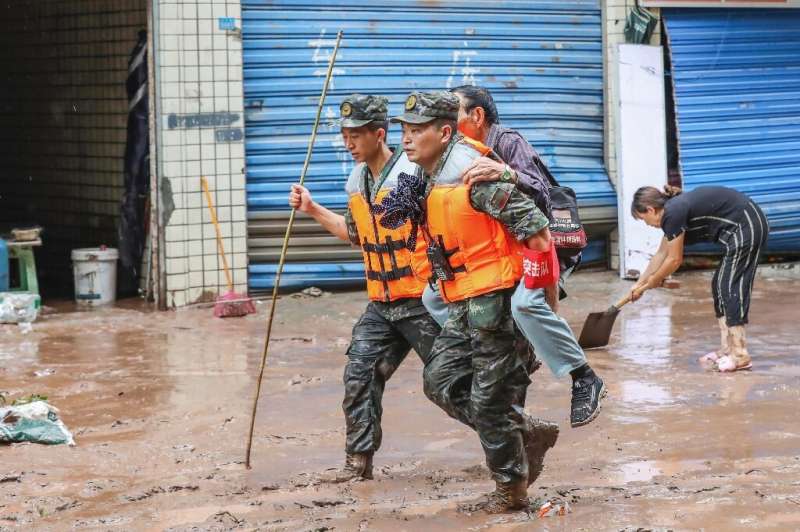This article has been reviewed according to Science X's editorial process and policies. Editors have highlighted the following attributes while ensuring the content's credibility:
fact-checked
reputable news agency
proofread
Fifteen dead as heavy rains lash southwest China

Fifteen people died and four were missing after torrential rain lashed the metropolis of Chongqing and swathes of southwestern China, local officials and state media said Wednesday.
China has for weeks been hit by extreme weather—from heavy rains to intense heatwaves—the frequency of which is increasing as global temperatures soar.
Residents in the capital Beijing and dozens of other areas have been warned to stay indoors as temperatures soar past 35 degrees Celsius (95 degrees Fahrenheit).
And in one of the deadliest natural disasters to occur in China so far this year, torrential rains in Chongqing this week "killed 15 people and left four others missing", local authorities told AFP.
"The heavy rains, mainly seen in the areas along the Yangtze River, have triggered floods and geological disasters, disrupting the lives of more than 130,000 people in 19 districts and counties," state-run news agency Xinhua said.
Images from state broadcaster CCTV posted on social media on Tuesday showed torrents of muddy water in Chongqing's heavily affected Wanzhou District overflowing embankments and pieces of debris being swept away.
And the Communist Party-backed People's Daily posted photos of ongoing rescue efforts Wednesday, showing emergency responders helping residents evacuate flooded residential buildings.
On the outskirts of Chongqing, workers on Tuesday discovered that a closed-off railway bridge had collapsed after it was "damaged by the impact of mountain torrents", CCTV said.
The government dispatched a working group to Chongqing early on Wednesday morning to oversee disaster relief efforts.
More is still to come, with officials warning that China is set to face "multiple natural disasters in July, including floods, severe convection weather, typhoons and high temperatures".
In response, President Xi Jinping has ordered that "authorities at all levels must give top priority to ensuring people's safety and property", Xinhua said Wednesday.
China's finance ministry has issued 320 million yuan ($44.2 million) in disaster relief to affected regions, which it said would be used by local governments to boost emergency search and rescue efforts.
Widespread damage
In neighboring Sichuan province, authorities said more than 460,000 had been affected by the heavy rain this month, Xinhua reported.
About 85,000 people have been evacuated from their homes as a result of the rain, officials said, with "flash floods in mountainous areas" and "possible mudslides in some parts" of China expected this week.
Scientists say that rising global temperatures—caused largely by burning fossil fuels—increase the likelihood of extreme weather events such as the flash floods and heatwaves experienced in many Asian countries in recent weeks.
China recorded an average of four days in which temperatures exceeded 35 degrees every month in the first half of this year, the highest since national records began in 1961, according to a National Meteorological Center statement on Sunday.
In June, Beijing sweltered through a total of 14 days of temperatures exceeding 35 degrees, matching the record set in July 2000, according to the state-run Beijing Evening News.
© 2023 AFP




















